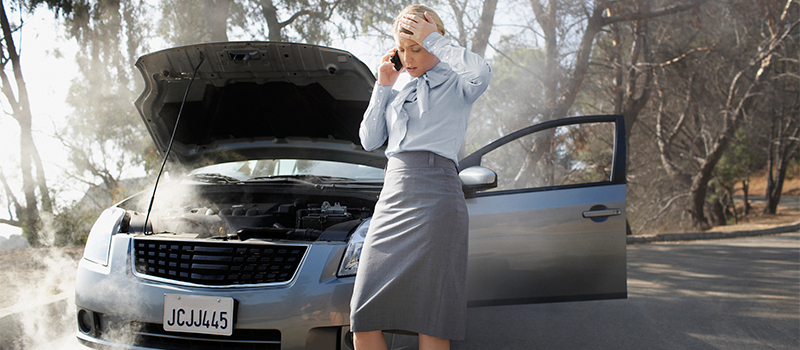Overheating Car in the Summer
Overheating Car in the Summer

Overheating Car in the Summer
Are you noticing reduced engine power? Is steam billowing out from under the hood? Is the temperature light on or the temperature gauge all the way up on your dashboard?
If any of this sounds familiar, then you may have an overheating engine - and engines are more likely to overheat when you are driving your vehicle during the hot summer months. Learn some common causes of a car overheating, how to help prevent your vehicle from overheating, and what to do if it happens.
Common Causes (and Prevention) of Car Overheating
Engine Coolant Issues
According to Kelley Blue Book, a vehicle's coolant should be flushed and replenished every 30,000 miles. It is one of the simplest ways to avoid an overheating engine. Aging coolant can collect rust and debris, and its lubricating properties can break down. This may all lead to blockages in coolant system passages.
Coolant leaks also contribute to overheating. If you see white or green stains under your vehicle, it could be indicative of a coolant leak.
Radiator Problems
Radiators help remove excess heat from the engine and are a key component of the coolant system. But over time, they are likely to corrode and lead to blockages in passages, which can cause the engine to run hot. Issues with the radiator cap and radiator fan can also lead to hotter running engines. The best way to avoid radiator problems is to ensure a mechanic inspects its condition when you take your vehicle in for oil changes or other servicing.
Other Common Issues
Other common causes of engine overheating include faulty gaskets, issues with the water pump, and problems with the heater core. A professional mechanic can diagnose and repair any issues during a routine vehicle inspection.
What to do if Your Car Overheats
Stay Calm and Pull Over
While an inconvenience, overheating vehicles are not a rarity. So, if your temperature gauge starts going haywire or smoke starts rising out from under your hood, the first thing you will need to do is pull over. If your engine is overheating, you should not continue driving. This could cause permanent engine damage.
Pop the Hood
Once you have pulled over, turn the engine off and pop the hood. Let things cool off for about 10 minutes, then assess the situation under the hood. In some cases, a hose may have come loose, or you may be out of coolant. If you are able to make any repairs, that can buy you some time, so you can get your car to a professional.
Contact a Professional Mechanic
You should not let any underlying issue go uncorrected. So, if you must catch a tow to the nearest mechanic or you are able to make a temporary fix and drive it in, be sure to get your vehicle serviced. Delaying service can cause more significant damage to the engine and other components.
